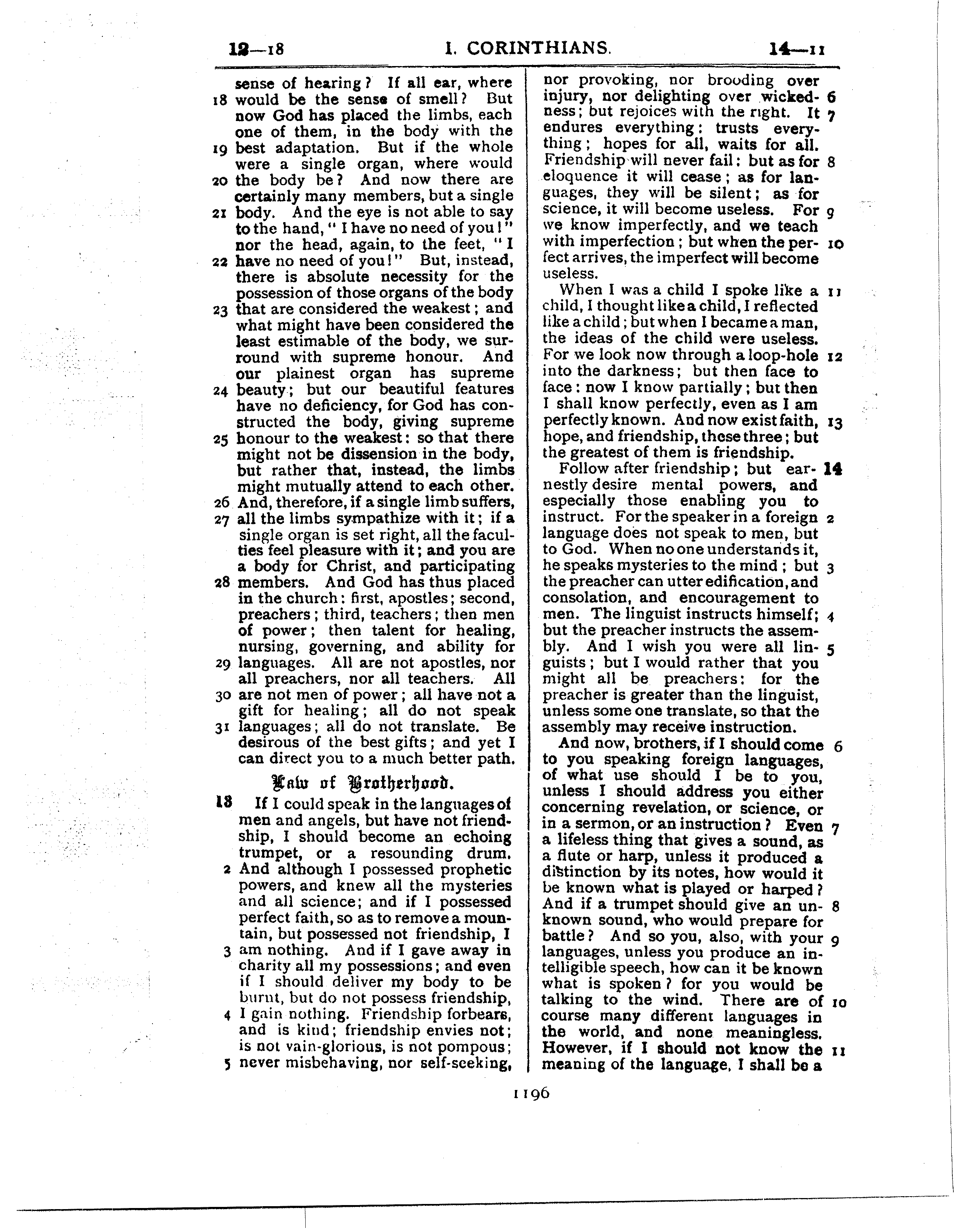I Corinthians - Ferrar Fenton Bible Translation page 1196
The New Testament
[E}
sense of hearing ? If all ear, where would be the sense of smell? But now God has placed the limbs, each one of them, in the body with the best adaptation. But if the whole were a single organ, where would the body be? And new there are certainly many members, but a single body. And the eye is not able to say Ihave no need of you l ’ I But, instead, there is absolute necessity for the possession of those organs ofthe body that are considered the weakest; and what might have been considered the least estimable of the body, we sur- round with supreme honour. And our plainest organ has supreme beauty; but our beautiful features have no deficiency, for God has con— structed the body, giving supreme honour to the weakest: so that there might not be dissensionin the body, but rather that, instead, the limbs might mutually attend to each other. And, therefore, if a single limb suffers, all the limbs sympathize with it; if a single organ is set right, all the facul- ties feel pleasure with it; and you are a body for Christ, and participating members. And God has thus placed in the church: first, apostles; second, preachers; third, teachers; then men of power; then talent for healing, nursing, governing, and ability for languages. All are not apostles, nor all preachers, nor all teachers. All are not men of power; all have not a gift for healing; all do not speak languages; all do not translate. Be desirous of the best gifts; and yet I can direct you to a much better path. @11:1 uf Qrnibzrhuuh. If I could speak in the languages oimen and angels, but have not friend~ ship, I should become an echoing trumpet, or a resounding drum. And although I possessed prophetic powers, and knew all the mysteries and all science; and if I possessed perfect faith, so as to remove a moun- tain, but possessed not friendship, I am nothing. And if I gave away in charity all my possessions; and even if I should deliver my body to be burnt, but do not possess friendship, I gain nothing. Friendship forbears, and is kind; friendship envies not; is not vain~glorious, is not pompous; never misbehaving, nor self-seeking, nor provoking, nor brooding over delih ked injury, nor gtingl over wic- ness; but rejoices wit the right. It endures everything: trusts every- thing; hopes for all, waits for all. Friendshipiwill never fail: but as for eloquence it will cease; as for lan- guages, they will be silent; as for science, it will become useless. For we know imperfectly, and we teach with imperfection ; but when the per· feet arrives, the imperfect will become useless. When I was a child I spoke like a
child, l thought likea child,I redected like a child ; but when I became a man, the ideas of the child were useless. For we look now through a loop·hole into the darkness; but then face to face: now I know partially; but then I shall know perfectly, even as I am perfectly known. And now exist faith, hope, and friendship, these three; but the greatest of them is friendship. IO I I I2
Follow after friendship; but ear- 14 nestly desire mental powers, and especially those enabling you to instruct. For the speaker in a foreign language does not speak to men, but to God. When noone understands it, he speaks mysteries to the mind ; but the preacher can utter edihcation, and consolation, and encouragement to men. The linguist instructs himself; but the preacher instructs the assem- bly. And I wish you were all lin· guists; but I would rather that you might all be preachers: for the preacher is greater than the linguist, unless some one translate, so that the assembly may receive instruction. And now, brothers, if I should come
to you speaking foreign languages, of what use should I be to you, unless I should address you either concerning revelation, or science, or in a sermon, or an instruction? Even a lifeless thing that gives a sound, as a iiute or harp, unless it produced a. distinction by its notes, how would it be known what is played or harped? And if a trumpet should give an un- known sound, who would prepare for battle? And so you, also, with your languages, unless you produce an in· telligible speech, how can it be known what is spoken? for you would be talking to the wind. There are of course many different languages in the world, and none meaningless. However, if I should not know the meaning of the language, I shall be a 1196 X0 I!
